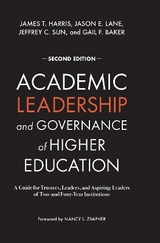
Academic Leadership and Governance of Higher Education
Stylus Publishing (VA) (Verlag)
978-1-57922-481-3 (ISBN)
- Titel erscheint in neuer Auflage
- Artikel merken
The authors go beyond the “positions” of leadership to emphasise the qualities of creativity, commitment, collaboration, delegation and courage that are essential to steer a unit, college or university through successful and enduring change
Recognising that the hallmark of higher education in the United States is a diversity of institutional types, this book enables the reader to relate issues of environment, organisation and management to his or her specific institution, from not only the presidential perspective, but from the vantage point of trustees, provosts, vice presidents, deans, and department heads. By covering all these functions—as well as the role of external stakeholders—in a single volume, this book offers readers a comprehensive view of how institutions respond to external forces and internal issues, and how these impact organisational structure, functions and decision-making in their roles, and the institution at large.
The book is informed by these three essential principles:
Sound institutional decisions must be based on a clearly articulated mission and set of core values;
Successful institutional adaptation to a changed environment must be grounded and aligned with the fundamental mission and core values; and
Successful academic leaders must be able to create and foster partnerships, bringing diverse individuals and interests together around a shared vision and mission grounded in common values.
This handbook is divided into five units. The first introduces the reader to the scholarly field of higher education and establishes the contextual framework for the rest of the book. The second investigates the multifaceted and often complex relationships that exist between institutions of higher learning and the external constituencies. The third focuses how college and university presidents and their board of trustees keep an institutional mission focused while adapting to changes in the environment, while the fourth analyses how colleges and universities fulfil their core mission through shared democratic partnerships. The concluding unit concerns how effective academic leaders implement their institution’s academic mission.
Both scholarly and accessible, this book is intended to be of interest to a broad audience, ranging from graduate students in higher education administration programs to members of institutional governing boards, and everyone in leadership positions in between.
All of the authors have completed graduate work in a higher education administration program, and collectively have had experience with academic administration at every level through to the university presidency. Two of the authors are currently faculty in leading higher programs teaching classes in administration and organisational theory and have published widely in the scholarly field. One has been a member of a governing board.
Robert M. Hendrickson is a professor of Education in Higher Education and Senior Scientist in and Interim Director of the Center for the Study of Higher Education at Penn State. His research and teaching interests include legal issues, organizational theory, administration and governance, and faculty employment issues. He has published a number of articles, monographs, and books. From 2001 thru 2007 he served as Associate Dean for Graduate Programs, Research, and Faculty Development within the College of Education. During his tenure as Associate Dean, six graduate programs were ranked in the top 10 in the US News rankings, and research awards grew from $4 million in 2001 to $18 million in 2007. Prior positions include head of the Department of Education Policy Studies for eight years and professor-in-charge of the Higher Education Program for nine years. Dr. Hendrickson has directed a number of doctoral dissertations, several of which have won outstanding dissertation awards. His former students serve in faculty or administrative positions in the United States and foreign countries and several are presidents of colleges and universities. Jason E. Lane is Director of Education Policy Studies at the Nelson A. Rockefeller Institute of Government, the public policy think tank of the State University of New York (SUNY). He is also an Associate Professor of Educational Administration and Policy Studies and a Senior Researcher with the Institute for Global Education Policy Studies at the University at Albany, SUNY, where he co-directs the Cross-Border Education Research Team (C-BERT). James T. Harris is President and Professor of Education at Widener University. Under his leadership, Widener has been recognized by The Chronicle of Higher Education as a "Best College to Work For," and Newsweek ranked Widener in the top 10 nationally for community service. Prior to his appointment at Widener, he served as President of Defiance College. Dr. Harris has served on the national boards of the Campus Compact, the NCAA, the National Association of Independent Colleges and Universities, the Coalition of Urban and Metropolitan Universities and the Council for Advancement and Support of Education (CASE). He has earned numerous awards, including being named as one of the top 50 character-building presidents in America by the Templeton Foundation and the Chief Executive Leadership Award from CASE. Dr. Harris has published over 20 academic articles and chapters and has been a faculty member in the Harvard University Management Development Program for over a decade. He earned degrees from the University of Toledo, Edinboro University of Pennsylvania, and Pennsylvania State University. Richard H. Dorman is the 14th president of Westminster College (PA), a co-educational national liberal arts institution recently ranked first in the nation as the "Best College for Women in Science, Technology, Engineering, and Math (STEM)" according to rankings by Forbes.com. He has served in various senior administrative capacities, including Vice President for Institutional Advancement at Otterbein College and Assistant Vice President at the University of Louisville, where he oversaw all development operations for the Health Sciences Center. Prior to that, Dr. Dorman was Associate Executive Director for Alumni Relations at the Penn State Alumni Association. During his tenure, the Association received the Council for Advancement and Support of Education (CASE) Grand Gold Medal as the best alumni association in America for an unprecedented three successive years. His research has centered on role conflict and role ambiguity of lay governing boards and he has served as a frequent speaker and consultant on institutional governance and alumni affairs. He holds a bachelor of music degree from Susquehanna University, a master's degree in counselor education in student personnel services, and a doctorate in higher education administration, both from Penn State.
Acknowledgments
Foreword: Academic Leadership and Its Consequences
Stanley O. Ikenberry
Introduction
Three Essential Principles
Organization of This Book
Part One: History, Politics, Globalization, and Organizational Theory in Higher Education
1) Principles of Academic Leadership
2) Understanding Academic Organizations
3) Global Engagement of Colleges and Universities
Part Two: External Constituencies
4) Federal Engagement in Higher Education
5) State and Local Governments' Relationship with Higher Education
6) The Courts and Higher Education
7) The Engaged College or University
8) External Influences and the Role of Supporting Organizations
Part Three: The Boundary Spanners
9) Trusteeship
10) The Academic Presidency
Part Four: The Academic Core
11) Governance of the Academic Core
12) Academic Departments and Departmental Leadership
13) The Faculty
Part Five: Implementation of the Academic Mission
14) The Student Experience
15) Planning, Assessment, and Budgeting
Authors
Index
| Sprache | englisch |
|---|---|
| Gewicht | 766 g |
| Themenwelt | Sozialwissenschaften ► Pädagogik ► Erwachsenenbildung |
| ISBN-10 | 1-57922-481-4 / 1579224814 |
| ISBN-13 | 978-1-57922-481-3 / 9781579224813 |
| Zustand | Neuware |
| Informationen gemäß Produktsicherheitsverordnung (GPSR) | |
| Haben Sie eine Frage zum Produkt? |
aus dem Bereich



